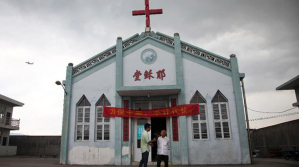
Government officials have authorized the removal of crosses from more than 130 Chinese Christian churches in the Zhejiang province. The government has demolished or partially destroyed hundreds of church buildings in the region, claiming that they have violated building codes.
Fox News reports that authorities tore down the cross which tops the Wuxi Christian Church in China twice recently, after it was replaced by church members. "It's the symbol of the death of Jesus and it's the symbol that people can be saved," says Pastor Xie Zuoka, who believes that the government is intentionally targeting Christians. The church's water and electricity has also since been shut off, and authorities are trying to install surveillance equipment in the church building. This is but one example of Christian persecution which has intensified in the Zhejiang province lately.
Other churches in the region have endured physical brutality from police authorities while defending their church buildings. Because authorities will not specify which building codes the churches are said to have violated, it is suspected that the atheistic Chinese government is attempting to display their power and hinder the spread of Christianity throughout the nation. The Christian Post reports that the government has at least partially demolished 360 churches in the region.
There are an estimated 163 million Christians in China. Many believers meet in government-sanctioned churches throughout the country, and some meet secretly in underground churches. It is thought that the widespread growth of Christianity in China has concerned government officials who may fear potential political resistance against the communist party.






